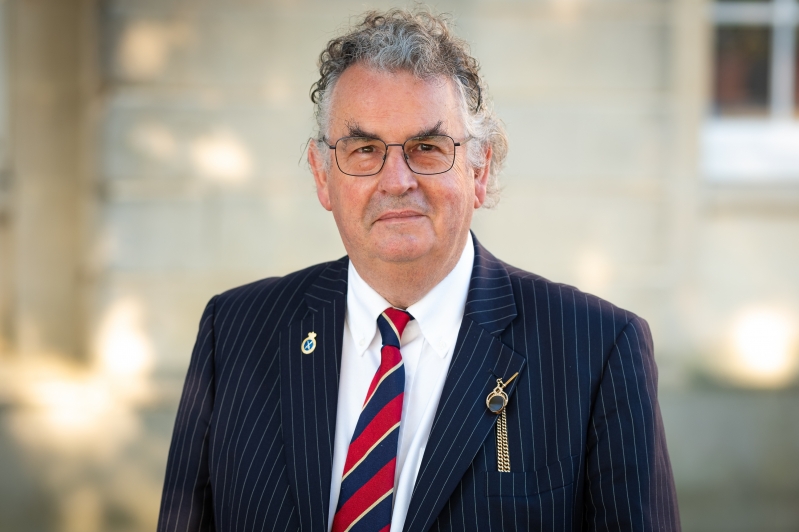
We are delighted to introduce Professor Medwin Hughes as the new Chair of Welsh National Opera. A distinguished leader in Welsh higher education and a passionate advocate for Welsh culture and language, Medwin brings a wealth of experience in transformational leadership and governance to this key role.
As WNO embarks on an exciting new chapter leading up to our 80th anniversary year in 2026, we asked Medwin to discuss his vision for the Company, his lifelong love of opera, and what it means to guide the Company into the future.
What does it mean to you to become Chair of Welsh National Opera?
It is both a privilege and a responsibility. Welsh National Opera is one of Wales's greatest cultural institutions - it tells stories that transcend language, history, and geography. To be able to play a small part in partnership with two wonderful new General Directors – Sarah Crabtree and Adele Thomas - means a great deal.
My focus will be on stewardship: helping ensure that the Company not only sustains its proud tradition, but also thrives in a changing world. For me, this is about strengthening its resilience, deepening its community engagement, and ensuring that it continues to reflect and celebrate the richness of Welsh life and identity.
What's your personal relationship with opera? Do you have a favourite opera or memorable WNO performance?
Since my university days standing outside Covent Garden queuing for hours for student tickets, I have always enjoyed the art form. Opera has always represented to me the highest form of storytelling where words, music, and theatre combine to move audiences profoundly.
I remember vividly my first encounter with WNO and the sheer scale of the productions, the emotional power of the music, and the commitment of the performers made a lasting impression. Over the years, works such as Carmen and The Magic Flute have stayed with me not only for their beauty but for the way they connect across cultures and generations. But more than any single opera, it is WNO's ability to bring world-class performance to communities across Wales and beyond that resonates with me personally.
You've led major transformational projects in higher education - how will that experience inform your approach as Chair of WNO?
Transformation requires clarity of purpose, courage to adapt, and sensitivity to people. In higher education, I worked through complex mergers, institutional change, and new governance frameworks. That taught me the importance of setting a clear strategy, building trust, and making decisions that are both ambitious and sustainable. This is about building strong communities of practice.
I see many parallels with WNO: we must honour tradition, but also innovate; we must maintain excellence, but also widen access; and we must ensure that governance and financial resilience support our artistic vision. Nobody said it will be easy or straightforward, but everyone agrees that the goal of sustaining and building this great company for the future is worth it.
As a first language Welsh speaker, how important is the Welsh language and Welsh culture to WNO's identity and future?
It is central. WNO is not just a touring company - it is Wales's national opera company. That carries with it an obligation to reflect the language, culture, and communities of this nation.
The Welsh language is a living heritage; it should not be confined to tokenistic gestures but embedded naturally into the identity and repertoire of the Company. At the same time, WNO must represent the diversity of modern Wales: inclusive, outward-looking, multilingual, and confident on the world stage.
Our task is to tell the honest stories of who we are as a people and a nation, and to excel in artistic excellence. We need to be bold, confident, and disruptive in our cultural curation. That is how we create great art and powerful storytelling.
How can opera remain relevant and accessible to diverse audiences across Wales and beyond?
Relevance comes from connection. Opera must continue to tell stories that speak to today's audiences, whether that's through reimagining classics, commissioning new works, or reaching out into schools, community centres, and digital platforms.
Accessibility means breaking down barriers - financial, geographic, linguistic, and social. Touring is essential, but so too is education and outreach, giving people of all ages and backgrounds the chance to experience opera for the first time.
Opera is for everyone; it should not be confined to one hall, one language, or one audience.
What excites you most about working with the leadership team and new board members?
I am excited by the passion, creativity, and sense of mission that the team brings. Leadership is not about one individual; it is about collaboration, trust, and shared vision.
WNO has an exceptional team of artists, administrators, and trustees who bring different skills and experiences. We are so fortunate in Adele and Sarah. My role is to support, challenge, and empower them so that together we create a Company that is artistically brilliant, financially resilient, and socially impactful. What excites me most is the opportunity to shape a future where WNO continues to inspire in Wales, across the UK, and internationally.



